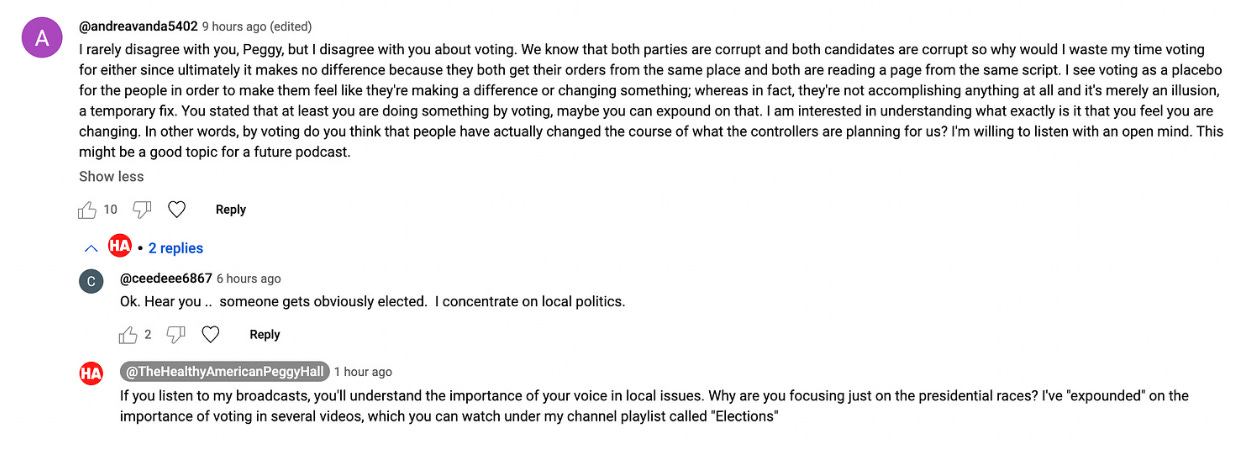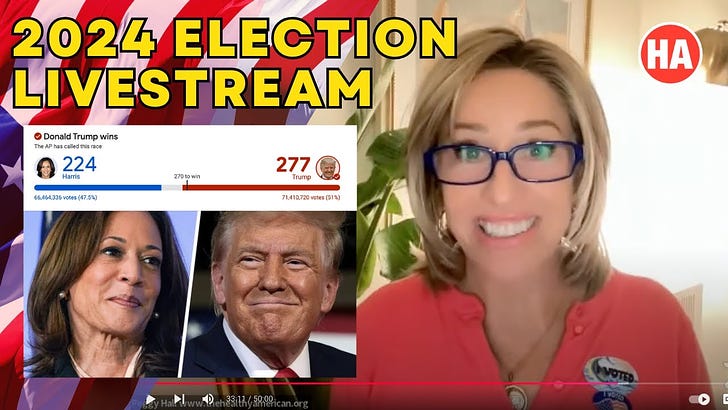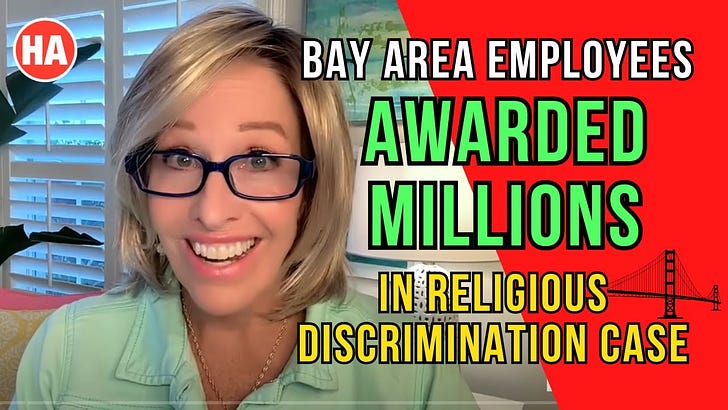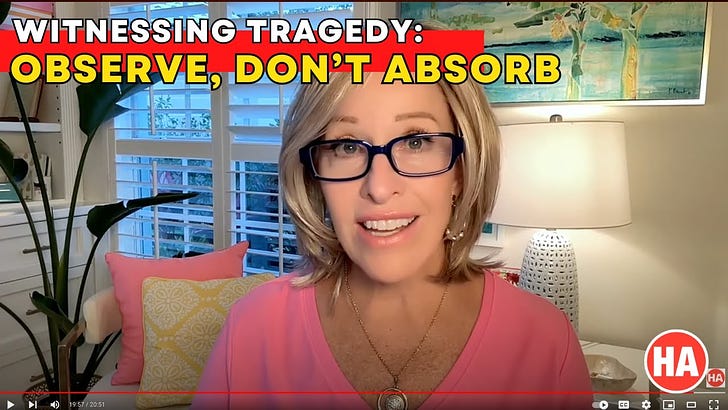If you thought opinions on vaccination were controversial, you ain’t seen nothin’ yet.
Who would have thought that something so common as voting could get people so riled up!
I’m not talking about the issues getting people riled up, or even the candidates getting people riled up – but the simple act of casting a ballot. It’s wild, really, how something as ordinary as voting can split opinions like nothing else.
And here’s the thing: It’s the fixation on the presidential race that has people missing the bigger picture, forgetting that our local races and ballot initiatives are where we actually feel the impact.
EXAMPLE A:
A recent comment on my video highlighted a classic case of causal reasoning gone astray: the belief that because presidential elections might be “rigged” or predetermined, then no vote matters at all.
This person was so caught up in the flaws of the presidential race that they entirely overlooked the real, tangible impact of local elections—the ones that shape our day-to-day lives in powerful ways. And the media circus around presidential campaigns only feeds this mindset, making it seem like all the power lies in Washington, when in reality, some of the biggest decisions happen much closer to home.
Is there corruption in politics? Absolutely. But that doesn't mean we should just throw our hands up and walk away.
Let’s start with the big one: the idea that because some national elections might be manipulated, it’s useless to vote at all. You’re frustrated with corruption? Me too. But how is staying home and doing nothing going to change that?
These are the very questions I’m asking — and will continue to ask.
I’m trying to figure out why certain people say that by voting, you are…
… entering into a contract with the government
… complying with and giving power to authorities over you
… giving your consent to the beast system
… playing into the hands of the globalists
… giving your energy and attention to an evil system
Those are the most common objections I hear. I’m curious as to the evidence that supports those statements. And I’m also curious as to what the alternative would be.
When I cast my ballot, I’m not empowering a distant system—I’m using my voice to support or reject laws that affect my state, my community, my daily life. If my vote helps block harmful laws, how does that strengthen “the system”?
And what exactly is the "Beast system"? And how does voting on local issues further that agenda? If anything, voting has allowed people to push back against globalist interests on the local level.
What about state initiatives where the results reflect the will of the people? In Florida, for instance, controversial bills giving more power to big corporations over marijuana control didn’t pass. If voting only serves “the powers that be,” how do we explain these upsets?
If it’s all an illusion, why do we see outcomes that actively go against corporate interests? People showed up, voted, and won.
Recent elections across the U.S. show that people can still push back against entrenched interests. Consider the following:
Expanded rent control in Commie California failed.
Baby killing measures in Florida, Nebraska, and South Dakota were blocked.
Marijuana expansion bills in states like Florida, North Dakota, and South Dakota didn’t pass.
Primary election changes in Idaho didn’t make it.
Californians voted for stricter penalties for theft and drug crimes.
If voting is meaningless or rigged, how do we explain these results?
You can’t tell me the powers-that-be didn’t want a stronger grip on issues like marijuana control in Florida, yet they lost. That’s not an illusion; it’s the result of people turning up, exercising their right, and refusing to sit back and let the chips fall where they may.
Some of you might be thinking, “By voting, aren’t we just consenting to a broken system?” Look, I get it—the frustration, the disillusionment. Our government isn’t perfect. But refusing to participate just means that someone else will decide these issues for you, no questions asked. I, for one, would rather have my say, whether it's to vote against a harmful bill or in support of one that aligns with my values.
The question I ask people is this: What’s the alternative? Here’s a common objection:
Okay, so are you truly liberated from government influence? So, you don't stop at red lights? You don't pay sales tax when you purchase something? Are you using US currency? Are you in debt? How exactly are you not consenting to being governed? I sincerely would like to know.
What is your solution? Anarchy??
Where is the enforcement? How does that not result in a complete meltdown of civil society? Please explain…
Without any authority, who enforces basic rules? If someone steals your property or infringes on your rights, where do you turn?
Imagine your neighbor puts in a fence that is on your property. Where are the laws to protect you?
You can just walk up to someone and force them to give you the keys to their car?
Where is the ENFORCEMENT for this type of free-for-all-system
What is your alternative? What’s your solution? Let me know in a comment below.
So far, I haven’t seen anything more effective than participating in the democratic process we have. The truth is, the system at its core isn’t inherently evil, even if certain players within it have lost sight of integrity.
I applaud everyone actively seeking a logical, reasonable, effective, and successful way to break free from government oppression. That’s something I’ve been fighting for years, so I get it when people say we don’t need government, that society should be self-governed by the people…
In a way, that’s actually how our political system began, with the idea that we elect representatives from the people. Unlike a monarchy, where power is inherited, our system was intended to empower individuals, not establish a ruling class. However, it’s fair to argue that our “political royalty” exists now—look at families like the Kennedys and the Bushes. But while the system has its flaws, I still believe in the principles and value of our political structure. If there’s an alternative, I’d genuinely like to hear it.
Our current system, with its flaws, allows us to voice opinions, particularly in state and local elections, where issues with a direct impact on our lives are decided. I believe there is still value in our federal republic and our Constitution, and I want to defend that. I’ve been where many of you are—disillusioned with voting. When I turned 18 and was eligible to vote, I asked myself if it was worth it, if it even mattered. Yet, I chose to participate, and I’ve spoken about this before.
When I vote, I’m not naively endorsing the whole system. I’m making my voice heard on laws and measures that impact me directly. Tuesday, I cast my vote against Proposition 3 & 4 in Florida, which would benefit big corporate interests in abortion and cannabis industries.
For those who’ve already given up on voting, I encourage you to rethink it. Get involved in local issues—those that impact you directly. For example, you could volunteer at a polling place, or you could go to your registrar of voters and watch as the ballots are counted.
Our system may not be perfect, but it’s one we all participate in, whether we like it or not. We’re all subject to laws, ordinances, and taxes. Yet, we’re also given a voice, especially at the local level.
I appreciate everyone searching for better solutions to government overreach—that’s an action I support. But while we work toward those solutions, let’s not abandon the tools we do have.
Read Next:



















Share this post